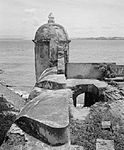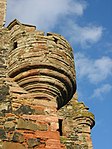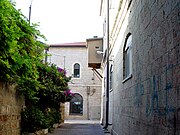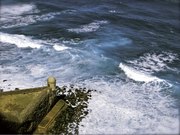Bartizan

A bartizan (an alteration of bratticing), also called a guerite, garita, or échauguette, or spelled bartisan, is an overhanging, wall-mounted turret projecting from the walls of late medieval and early-modern fortifications from the early 14th century up to the 18th century.[1] Most frequently found at corners, they protected a warder and enabled him to see his surroundings. Bartizans generally are furnished with oillets or arrow slits.[2] The turret was usually supported by stepped masonry corbels and could be round, polygonal or square.[3]
Bartizans were incorporated into many notable examples of Scottish Baronial architecture. In the architecture of Aberdeen, the new Town House, built in 1868–74, incorporates bartizans in the West Tower.
Gallery[]
At walls[]
Guarita at Fortaleza de Santiago, Sesimbra Municipality, Portugal.

Gardjola at the Spur, Senglea, Malta.

Garita at El Cañuelo in the Bay of San Juan, Puerto Rico.

South-East Bartizan on Greenknowe Tower, Scottish Borders (and another one in the background)

Bartizan at Fort de Chartres, a French colonial era fort in Illinois on the Mississippi River.

Garita at Castillo San Cristóbal (San Juan) in San Juan, Puerto Rico.

A bartizan-style British concrete position at Sergei courtyard, Jerusalem. This is probably the sole existing testimony of the British "Bevingrad" constructed in 1946.

Devil's Sentry Box, or the "Garita del Diablo", San Cristóbal Castle, in San Juan, Puerto Rico.
At towers[]

Bartizans on the West Tower of the new Town House in Aberdeen, Scotland, 1868–74.

Manueline Guaritas at Belém Tower in Lisbon, Portugal.

Bartizans at Feartagar Castle, Ireland.

Courtyard of Bergh House, 's-Heerenberg, Netherlands
The Peace Palace bell tower, The Hague, Netherlands

Martinstor, Freiburg, Germany
See also[]
| Look up bartizan, bartisan, échauguette, or guerite in Wiktionary, the free dictionary. |
- Bretèche
- Garret—an attic or top floor room in the military sense; a watchtower from the French word garite
References[]
| Wikimedia Commons has media related to Bartizans. |
- ^
 One or more of the preceding sentences incorporates text from a publication now in the public domain: Wood, James, ed. (1907). "Bartizan". The Nuttall Encyclopædia. London and New York: Frederick Warne.
One or more of the preceding sentences incorporates text from a publication now in the public domain: Wood, James, ed. (1907). "Bartizan". The Nuttall Encyclopædia. London and New York: Frederick Warne.
- ^ One or more of the preceding sentences incorporates text from a publication now in the public domain: Chisholm, Hugh, ed. (1911). "Bartizan". Encyclopædia Britannica. 3 (11th ed.). Cambridge University Press. p. 450.
- ^ Bradley, Simon, ed. (2010). Pevsner's Architectural Glossary. Yale University Press. p. 33. ISBN 978-0-300-16721-4.
- Castle architecture
- Fortification (architectural elements)
- Fortified towers by type













